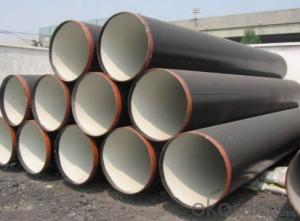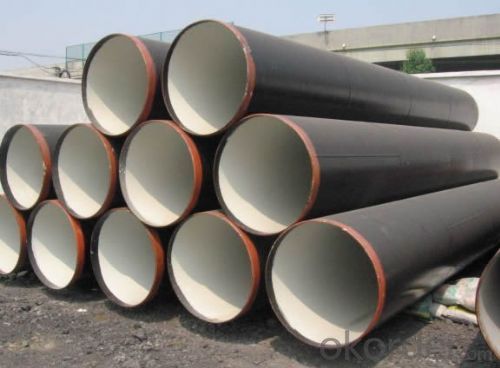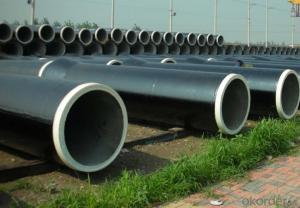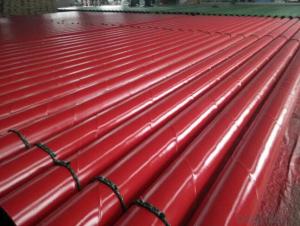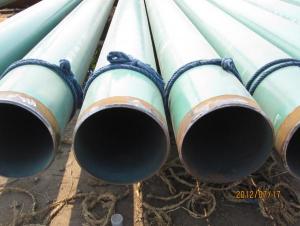COATED 3PE LINE PIPE
- Loading Port:
- China Main Port
- Payment Terms:
- TT OR LC
- Min Order Qty:
- -
- Supply Capability:
- -
OKorder Service Pledge
OKorder Financial Service
You Might Also Like
Packaging & Delivery
| Packaging Detail: | Plastic plugs in both ends Hexagonal bundles of max. 2000kg with several steel strips Two tags on each bundle Wrapped in waterproof paper PVC sleeve and sackcloth with several steel strips Plastic caps |
| Delivery Detail: | within 45 days after confirmation |
Specifications
API 5L PSL1/PSL2 Gr.B/X42/X52/X56/X60/X65/X70/X80 3PE/FBE Coated Line Pipe
OD: 2"-30",
WT:0.250"-4"
L:random,fixed,SRL,DRL
Application
Used for construction of long distance pipelines for combustible liquids and gases, nuclear station pipelines, heating system pipelines, general-purpose pipelines, vessels manufacturing, mechanical engineering and instrumental engineering.
DISTINCTIVES FEATURES
A) The External surface is shot-blasted (Sa 2 1/2) by removing millscale and rust, obtaining metal surface to facilities the adhesion.
B) The pipe is heated in a electric or gas oven at a controlled temperature.
C) The adhesive is then applied by hot meit or copolymer. It binds the polythylene to the steel.
D) Immediately afterwards, the extruded polyethylene/polyprophylene is coated on the pipe.
E) After application of the polyethylene/polyprophylene, the pipe is coated by spraying water.
Process
SEAMLESS
HOT ROLLED
COLD DRAWN
WELDED
ERW (Electric Resistance Welded)
HFI (High Frequency Induction)
EFW(ELECTRIC FUSION WELDED TUBE)
LSAW (Longitudinal Submerge-arc Welded) UO(UOE),RB(RBE),JCO(JCOE)
DSAW (Double Submerged arc welded)
SAW (Spiral Welded)
SSAW (Spiral Submerged-arc Welded)
Quality Standard
SEAMLESS PROCESS
GB/T 8163 Seamless steel tubes for liquid service
ASTM A106 Standard Specification for Seamless Carbon Steel Pipe for High-Temperature Service
DIN 1629 SEAMLESS CIRCULAR TUBES OF NON ALLOY STEELS WITH SPECIAL QUALITY REQUIREMENTS
API 5L Line Pipe
WELDED PROCESS
ERW HFI , EFW, LSAW, DSAW
GB/T3091 Welded steel pipe for low pressure liquid delivery
GB/T9711 Petroleum and natural gas industries--Steel pipe for pipelines
EN10217 Welded steel tubes for pressure purposes.
IS 3589 Steel tubes for water and sewage
IS 1978-1982 Steel tubes for use in transportation of oil; gas & Petroleum products
BS 1387 Steel Tubes for use for Water, Gas, Air and Steam
ASTM A53 Standard Specification for Pipe, Steel, Black and Hot-Dipped, Zinc-Coated, Welded and Seamless
DIN 2458 WELDED STEEL PIPES AND TUBES
API 5L Line Pipe
SAW SSAW
SY/T5037 Spiral submerged arc-welded steel pipe for pipelines for low pressure field fluid service
SY/T 5040 Spiral submerged arc-welded steel pipe piles
CJ/T 3022 Spiral submerged-arc welded steel pipe for municipal heat supply
IS 1978 Steel tubes for use in transportation of oil; gas & Petroleum products
API 5L Line Pipe
Coating Standard
ANSI/AWWA C104/A21.4 American National Standard for Cement-Mortar Lining for Ductile-Iron Pipe and Fittings for Water
ISO 21809 Petroleum and natural gas industries -- External coatings for buried or submerged pipelines used in pipeline transportation systems
DIN 30670 Polyethylen coatings of steel pipes and fittings
Steel Grade
SEAMLESS PROCESS
GB/T 8163 10# 20# 35# 45# 16MN(Q345B)
GB 3087 10# 20# 35# 45# 16MN(Q345B)
GB 5310 20G 12Cr1MoV 12Cr1MoVG 12CrMoG
ASTM A106 Gr A Gr B Gr C
DIN 1629 St 37.0 St 44.0 St 52.0
API 5L A B X42X46 X52 X60 X65 X70 X80
WELDED PROCESS
GB/T3091 SY/T5037 SY/T 5040CJ/T 3022
Q195 Q215 Q235 Q275 Q295 Q345 08F 08 08AL 08F 10F 10 HG5 DF08 SPHC M8
BS 1387 EN10217 S185 S235 S235JR S235 G2H S275 S275JR S355JRH S355J2H St12 St13 St14 St33 St37 St44 ST52
ASTM A 53 Gr. A Gr B Gr C Gr.D
API 5L A B X42 X46 X52 X56 X60 X65 X70
GB/T9711 L175 L210 L245 L290 L320 L360 L290 L320 L360 L390 L415 L450 L485 L555
Size
SEAMLESS PROCESS
Outer Diameter Hot finish 2" - 30" Cold drawn 0.875" - 18"
Wall Thickness Hot finish 0.250" - 4.00" Cold drawn 0.035" - 0.875"
Length Random Length Fixed Length SRL DRL
WELDED PROCESS
ERW HFI EFW
Outer Diameter 6mm-610mm (1/16"-24")
Wall Thickness 0.3mm-22mm
Length 0.5mtr-20mtr
LSAW DSAW
Outer Diameter 219mm-1820mm
Wall Thickness 5.0mm-50mm
Length 6mtr-18mtr
SAW SSAW
Outer Diamter 219.1mm - 4064mm (8" - 160")
Wall Thickness 3.2 mm - 40mm
Length 6mtr-18mtr
End
square ends (straight cut saw cut and torch cut);
beveled for welding (All line piping is square cut to the tolerance specified and bevelled to ANSI B16.25. An angle of 30º (-0º +5º) and a landing of 16 mm ±08 mm is applied. Schedule 160 material is supplied without bevelling.)
Surface Lightly oiled Hot dip galvanized Electro galvanized Black Bare Varnish coating/Anti rust oil Protective Coatings (Coal Tar Epoxy Fusion Bond Epoxy 3-layers PE)
Test Chemical Component Analysis Mechanical Properties (Ultimate tensile strength Yield
strength Elongation) Technical Properties (Flattening Test Bending Test Hardness Test Blow Test Impact Test etc.) Exterior Size Inspection Hydrostatic Test(The standard pressure is limited to 207 MPa (3000 psi)) X-ray Test.
Mill Test Certificate EN 10204/3.1B
Third party inspection SGS BV Lloyds etc.
- Q: What are the different methods of repairing steel pipes?
- There are several methods to repair steel pipes, including welding, flange coupling, sleeve coupling, epoxy coating, and pipe lining.
- Q: How are steel pipes used in the manufacturing of heat exchangers?
- Steel pipes are commonly used in the manufacturing of heat exchangers due to their excellent heat transfer properties and durability. They are utilized as the main components for carrying and transferring hot or cold fluids within the heat exchanger system. The steel pipes ensure efficient heat exchange by providing a smooth and continuous flow of the fluid, while also withstanding high temperatures and pressures. Additionally, steel pipes are often preferred for their corrosion resistance, making them suitable for various industrial applications requiring reliable and long-lasting heat exchangers.
- Q: What is the flexibility of steel pipes?
- Steel pipes possess exceptional flexibility, rendering them highly versatile and suitable for a wide array of applications. Their flexibility is derived from the inherent properties of steel, such as its high tensile strength and ductility, enabling them to bend and endure various forms of stress without breaking or deforming. The structural integrity of steel pipes remains intact even when bent or shaped into different forms. This facilitates simpler installation and routing around obstacles, making them more adaptable for intricate plumbing or piping systems. Furthermore, the flexibility of steel pipes allows them to withstand external forces like ground movements or temperature fluctuations without sustaining significant damage. Moreover, the flexibility of steel pipes makes them ideal for applications that involve dynamic movement or expansion. In the case of oil and gas pipelines or heating and cooling systems, where temperature variations can lead to expansion and contraction, steel pipes can accommodate these changes without causing leaks or failures. Additionally, the flexibility of steel pipes contributes to their durability and longevity. The ability to endure bending and stress prevents the formation of cracks or fractures that could result in leaks or structural failures. This characteristic establishes steel pipes as a dependable choice for demanding environments, including high-pressure systems or corrosive conditions. To sum up, the flexibility of steel pipes is a crucial attribute that allows for effortless installation, adaptability to diverse conditions, and long-term reliability. Due to their remarkable flexibility, steel pipes are extensively preferred in numerous industries and applications where strength, durability, and versatility are paramount.
- Q: Can steel pipes be used for conveying sewage and wastewater?
- Yes, steel pipes can be used for conveying sewage and wastewater. Steel pipes are known for their strength, durability, and resistance to corrosion, making them suitable for transporting various types of fluids, including sewage and wastewater. Additionally, steel pipes can withstand high pressure and are capable of handling the abrasive and corrosive nature of sewage and wastewater, making them a reliable choice for such applications.
- Q: What is the single length of galvanized steel pipe?
- Hot dip galvanized steel pipe is widely used in fire, power and highway.
- Q: What is the role of steel pipes in sewage systems?
- Steel pipes are commonly used in sewage systems as they provide durability, strength, and resistance to corrosion. They serve the crucial role of transporting wastewater, sewage, and other fluids from buildings to treatment facilities or disposal sites. Steel pipes are able to withstand the high pressure and gravity flow of sewage, ensuring the safe and efficient conveyance of waste materials.
- Q: How are steel pipes protected from corrosion?
- Steel pipes are protected from corrosion through various methods such as applying protective coatings like paint or epoxy, galvanization, and cathodic protection. These measures create a barrier between the steel surface and corrosive elements to prevent the pipes from rusting and deteriorating.
- Q: How do steel pipes connect to other components?
- Steel pipes can be connected to other components using various methods, including welding, threading, flanges, and couplings. These connections ensure a secure and leak-proof joint between the steel pipe and other components, allowing for efficient fluid or gas transfer in various industries.
- Q: What are the different wall thicknesses available for steel pipes?
- Steel pipes are available in various wall thicknesses to meet specific requirements and applications. Different schedules indicate the wall thickness. The most commonly used wall thicknesses for steel pipes are Schedule 40, Schedule 80, and Schedule 160. Schedule 40 pipes have a medium wall thickness and are commonly used for general-purpose applications, like conveying fluids and gases. They are suitable for low-pressure systems and widely used in plumbing, HVAC, and irrigation systems. Schedule 80 pipes have a thicker wall compared to Schedule 40 and are designed for high-pressure applications. They are commonly used in industrial settings, oil and gas pipelines, and high-pressure fluid transport systems. The increased wall thickness ensures higher strength and durability to withstand pressure. Schedule 160 pipes have the thickest wall among the available options. They are designed for extremely high-pressure applications, such as refineries, chemical plants, and power generation facilities. These pipes offer exceptional strength and can handle intense pressure and stress in industrial environments. In addition to standard schedules, there are other wall thicknesses available for specific purposes. For instance, extra-strong (XS) pipes have a thicker wall than Schedule 80 pipes and are used for applications requiring even higher pressure resistance. It is crucial to consult professionals or refer to industry standards to determine the appropriate wall thickness for a specific application. Factors like fluid or gas pressure, temperature, and environmental conditions should be considered when selecting the suitable steel pipe with the desired wall thickness.
- Q: Do steel pipes expand or contract with temperature changes?
- When the temperature increases, steel pipes undergo expansion, while they contract when the temperature decreases. This occurrence is due to the thermal expansion and contraction characteristics of steel, which are present in most materials. When steel pipes are heated, the molecules within the metal gain energy and vibrate more intensely, causing them to separate and increase in size. On the contrary, when the temperature of the steel pipes decreases, the molecules lose energy and move closer together, resulting in a reduction or shrinking in size. It is crucial to take into consideration these thermal expansion and contraction properties of steel pipes during their design and installation, as failure to accommodate these fluctuations might result in structural damage, leaks, or other complications.
Send your message to us
COATED 3PE LINE PIPE
- Loading Port:
- China Main Port
- Payment Terms:
- TT OR LC
- Min Order Qty:
- -
- Supply Capability:
- -
OKorder Service Pledge
OKorder Financial Service
Similar products
Hot products
Hot Searches
Related keywords
